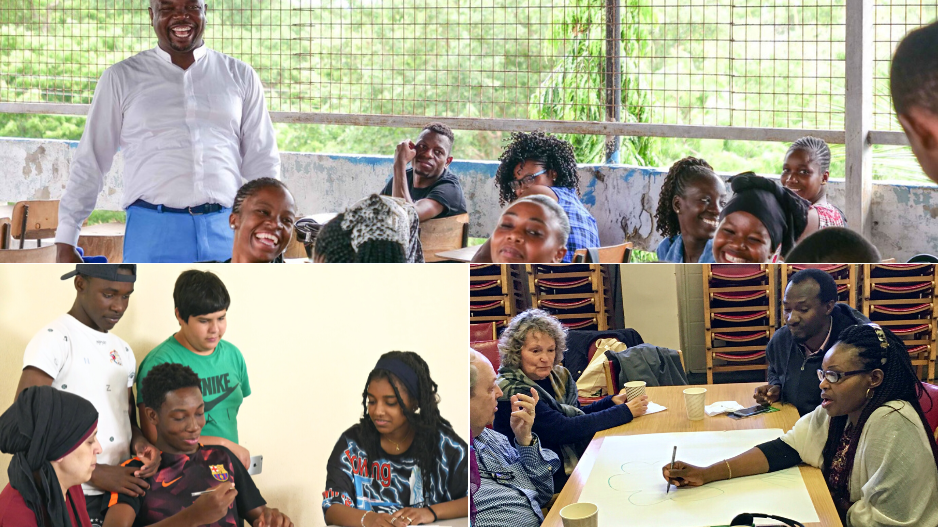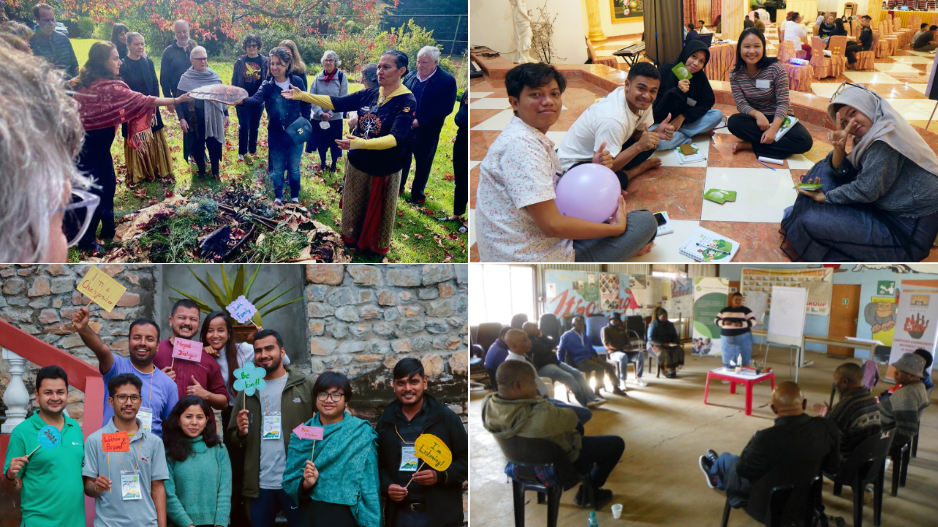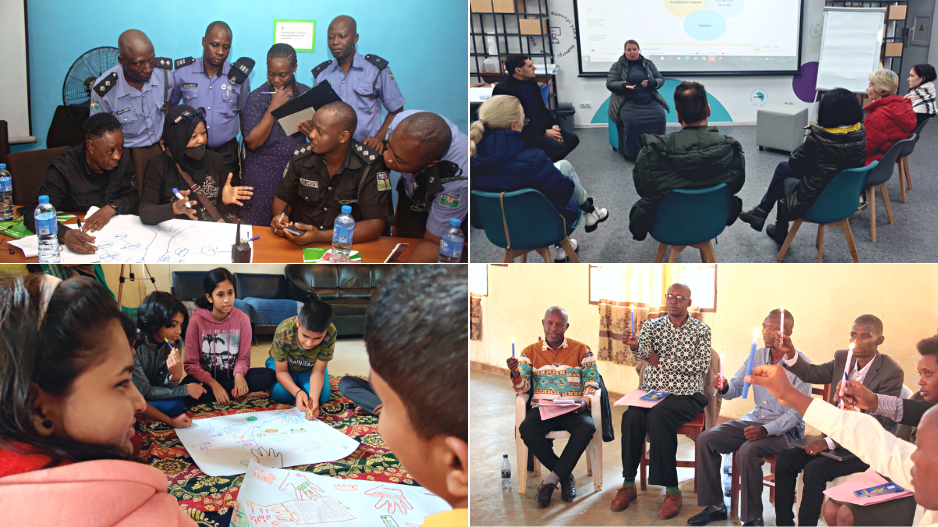Three years of building trust
Three and a half years of the Trustbuilding Program has made an impact. This is the story of how it started and evolved.
Year 1 teams (2019/20)
The first year of the TBP started with three teams in Kenya, France, and Canada.
In France, the team’s work has reached over 1,000 young people through over 885 workshop cycles delivered in educational institutions in the suburbs of Paris. The project offers disillusioned French youth an alternative to radicalisation and inspires them to become active citizens. “It was enriching for the students to be part of the project. It has made them better citizens, who now see society and the world differently.” – Madame Bertrand, teacher.
The Kenyan team focuses on the breakdown of trust between Muslims and Christians in Mombasa and Garissa. The team has been the only organisation trusted to work at Garissa University following a deadly terrorist attack there in 2015, which killed 147 people. For the first time since the attack, teachers share that when you walk into a classroom, you see connection, integration, and friendship between the Christian and Muslim students. Several beneficiaries now run their own trustbuilding initiatives.
In Canada, the team have taken on the unspoken divisions in Quebec around discrimination and racism affecting immigrants and indigenous peoples.

Year 2 teams (2020/21)
The second year saw the first expansion and scale-up of the program by taking on four new IofC teams. Australia, Indonesia, Nepal and South Africa.
Considerable breakthroughs are being made in Australia in delivering meaningful activities such as Yarning Circles (First Nation dialogues), creating allies with First Nation leaders (e.g. the Federal Minister for Indigenous Australians), and creating energy nationally around truth-telling and truth-hearing of the deep-rooted divide between Indigenous and non-indigenous peoples. By reaching nearly 2,000 people directly, the TBP has put IofC Australia on the radar for advancing reconciliation leadership with pathways for Indigenous self-determination.
The Indonesian team is reaching marginalised groups and hosting safe spaces for rare dialogues, e.g. between minority religious groups. They have created their own card game and board game that build tolerance and understanding, trained close to 300 community leaders, and expanded their trustbuilding work to four cities. Their goal is to develop trustbuilding teams and networks across the country. Two Trustbuilding Camps recently made it to national TV news.
In Nepal, the team has gained recognition and national press coverage for impacting an issue that was not discussed publicly. Through official partnerships with the government, training close to 1,000 people and delivering over 75 trustbuilding events, the team has made substantial advances in bridging the divide between Madhesi and Pahadi communities. Madhesi people invited Pahadi individuals into their homes (which is extremely rare in Nepal). Some Pahadi people attended a Madhesi wedding for the first time, youth have made friends between the communities and government officials are reaching out and listening to each other.
The trustbuilding work in South Africa focuses on healing intergenerational traumas caused by fractured family structures to increase community trust. The project gives individuals the inner resources, hope and courage to move beyond their trauma and become positive, productive members of society. The team has positively influenced over 1,000 direct beneficiaries in Johannesburg and Cape Town through their Inner Healing workshops and family dialogues.

Year 3 teams (2021/22)
The highlight of the third year was the recognition of the TBP’s work by being awarded the UN’s Intercultural Innovation Award (IAA). Following a competitive process with over 1,100 applications from 120 countries, ten finalists, including the TBP, were awarded the IIA. The award included a year of capacity-building support from BMW and Accenture and a $20,000 grant. Talia Smith received the award on behalf of the TBP at a ceremony in Dubai in December 2021.
The third year saw the program continue to scale up and grow by taking on another four new IofC teams. Burundi, India, Nigeria, and Ukraine (which, soon after their launch, was paused due to the war).
Burundi addresses the historical wounds created through ethnopolitical divisions and restoring community trust. Deep personal stories are shared by participants in dialogues in a quest to develop understanding between Hutu and Tutsi ethnic groups. One recent dialogue gathered twenty participants whose family members were victims of the killings in Burundi from independence to 2015. Participants shared their stories of surviving the violence and how, as a community, they can move forward.
The team in India works to close the cultural gap between rural and urban youth by developing mutual understanding, tolerance, and connections. They work in partnership with schools and, for example, organise residential trustbuilding training for rural and urban teachers, in-person and online student meetings, and outreach activities. Evaluation data shows that perceptions and stereotypes were positively changed, understanding increased, and friendships were made.
In response to the #EndSARS campaign in Nigeria, the team are building trust between the police and the community. They delivered trustbuilding workshops for 50 police in preparation for an event that brought together 210 community members, leaders, and police in an honest conversation about how the police can serve the community in a better way. Over 500 beneficiaries were already reached directly through the trustbuilding work. Team member Israel used to live a life of crime and now works with the TBP to engage the police and his old community (notorious for gangs). He shared his story of change to encourage community members to have a dialogue, facilitated by the TBP, with the police.
After a five-month pause, our courageous team in Ukraine are up and running again. The team have re-strategised the original focus of the TBP to building trust between Internally Displaced People (IDPs), local authorities and host communities - a huge need across the country. They are working in three target communities, delivering monthly trustbuilding sessions.
Visibility, recognition, and awareness of IofC and the TBP have accelerated this year. For example, the TBP was featured in an article in British Vogue (online and in print reaching over 2.7 million readers in print alone), and TBP Nigeria, Indonesia and Nepal secured press coverage in national media.

What’s next?
Next year, the twelfth IofC team will join the TBP. In January 2023, Cameroon will start their project of building trust between Anglophone and Francophone communities through youth. We will also begin the fifth rollout and expansion process with the possibility of opening the TBP to partnerships with external organisations.
The TBP has come a long way in three short years, yet there are still challenges to manoeuvre around and improvements to be made. As the world navigates severe crises, IofC and the TBP’s messages and approach are critically needed. The time is now, with urgency, to build trust across the world’s divides.
